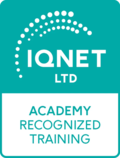Online course: The Role of Management in Implementing Information Security Requirements in Civil Aviation
💡 This course is part of the Academy of Information Security in Civil Aviation - PART-IS Manager training.
| |
"One Course, two Certificates" |
The training is intended for the management of organizations in the aviation sector that are obliged to implement requirements in accordance with the EASA PART-IS regulation. The program provides an overview of the requirements from IS.I.OR.100 to IS.I.OR.260, which directly relate to the responsibilities of management in establishing, implementing, monitoring, and improving the Information Security Management System (ISMS).
Through two structured blocks, participants will gain a clear understanding of the strategic, managerial, and supervisory obligations imposed on management by the regulations. Special emphasis is placed on topics such as establishing the ISMS, defining policies and responsibilities, risk management, contractual implementation of the ISMS, and continuous improvement. The program also addresses the role of management in handling incidents and cooperating with competent authorities and external providers.
Lecture Content
The training is divided into two learning blocks, each lasting 90 minutes:
- Strategic Responsibility and ISMS Establishment
- Operational Oversight, Compliance, and ISMS Improvements
| ➤ Strategic Responsibility and ISMS Establishment This topic addresses the fundamental role of management in establishing and developing the Information Security Management System (ISMS) within civil aviation organizations. The requirements from IS.I.OR.100 to IS.I.OR.200 are explained in detail, with emphasis on the strategic obligations of top management. ➤ Operational Oversight, Compliance, and ISMS Improvements This topic provides a detailed overview of the key responsibilities of management in implementing, overseeing, and continuously improving the Information Security Management System (ISMS), in accordance with the requirements from IS.I.OR.205 to IS.I.OR.260. The focus is on management’s operational activities to ensure the system is not only formally established but functions effectively and meets regulatory expectations. |
Who Should Attend This Training?
The training is intended for members of top management, heads of safety and compliance departments, heads of organizational units responsible for information security, and those ensuring compliance with EASA PART-IS requirements. It is also recommended for members of supervisory boards and internal auditors who oversee ISMS operations within the organization.
Learning Outcomes
Upon completion of the training, participants will be able to:
- understand the strategic role of management in establishing the ISMS,
- connect regulatory requirements with the organization’s business objectives,
- identify management responsibilities in incident handling and risk management,
- understand the importance of cooperation with competent authorities and contractual partners,
- supervise continuous ISMS improvements based on feedback and monitoring results.
Literature
|
Discounts
| We offer attractive discounts for group registrations. The applicable rates are as follows:
|
Additional information: Bojan Varga, e-mail: bojan.varga@siq.si
-
Please inform me of the next dateDates: 20.04.2026ID: 19706Please choose a dateRegistration
-
Duration:
1 Day (10:00 - 13:15)
4 school hours - Lecturer: Davorin Kacian
- Registration fee: 229,00 EUR (does not include VAT)
We value and reward your loyalty
That is why we are introducing the Loyalty Bonus to reward our loyal participants.
More about loyalty bonus
